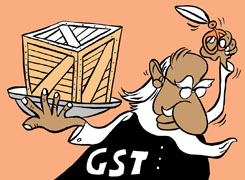Tejas Chokshi | Answer |Ask -Follow
Tax Expert - Answered on Apr 18, 2023
He is an information system auditor, a forensic auditor and concurrent bank auditor.
Chokshi, who has a master’s degree in management, audit and accounting from Gujarat University, has completed his CA from the Institute of Chartered Accountants of India.... more

I'm a Legal professional engaged as a Consultant with a Company and getting INR 1,50,000/- per month (Annual - INR 18.00 Lakh) as Consultancy Fee. In addition to Consultancy Fee., I've been provided with free accommodation in the township. the value of accommodation as per IT Act/Rules is assessed at INR 9,500/- per month (Annual - 1,14,000/). TDS is also deducted !10% on the Consultancy Fee as also on free accommodation under Section 194R (perquisites). My Total Income from Professional is !8 Lakh + 1.14 Lakh (value of perquisites) = 19.14 Lakh. Am I required to get registration under GST and raise GST Invoice on the Company? Kindly clarify. Shall be grateful for the help. Regards, Rakesh Tiwari
1) I have understood that you are not an "employee" of the company and so, provisions of "Income under the head Salaries" under the provisions of the Income - Tax Act, 1961 of India, would not be attracted. And so, your income won't fall under the head salaries.
2) Again, as mentioned by you, the TDS is deducted under @10.00% on consultancy fees (under provisions of Sec 194J ) and also on free accommodation.
Section 194 R is a newly inserted section, and it is applicable from July 1, 2022. The wording of this section reads, ... It mandates a person responsible for providing any benefit or perquisite to a resident to deduct tax at source at a rate of 10% of the value or aggregate value of such benefit or perquisite before providing it to the resident......
.......The provision of this section shall not apply to an individual or a Hindu Undivided Family (HUF) whose total turnover/sales/receipt doesn’t exceed INR 1 crore in case of business or INR 50 lakh in case of profession....
TDS deducted under provisions of Sec 194R itself infer that, you are not an employee of the company, else the TDS of such "benefits" would have been deducted under provisons of "Salaries".
In most cases, the deductor of the tax may not be aware about the actual income of yours ( since you are a lawyer, TDS @ 10.00% under section 194R would not have been deducted, if the income from profession is less than ₹50.00 lacs per annum. The deductor might felt to comply with these provisions and may have deducted the TDS AT 10.00% }
To summarise, as explained above,
a. Your income from consultancy fees and as consultant is liable to be taxed under the provisions of "Income from Business Profession" { Section 28 of Income tax Act, 1961}, considering the fact you are a legal professional and getting consultancy fees is your main source of income, under normal course of business.
b. You can claim other legitimate expenses against this income, which you might have incurred to earn this income, as legitimate deduction. Eg. conveyance expenses, stationery expenses, salary payment to your staff,electricity bill, etc.
3) Coming to GST provisions:
There a concept of reverse charge in case of GST , which is applicable to certain class of service providers and legal professional is one of them. As per my reading of the law, if legal services are provided to a corporate body with turnover exceeding Rs 40 lakh, then GST is applicable on reverse charge basis. You are requested to verify, if the consultancy provided by you as consultant to the receiver of the serivices is a corporate & whoes turnover exceeds ₹40.00 Lacs, then, then, it would be the responsibility of the receiver of the services, to honour the GST liability arriving due to payment of consultancy fees to you , as a legal professional, under reverse charge mechanism & if the turnover of such service recipient, is less than ₹40.00 Lacs & if the total receipt under business professional of the service provider exceeds ₹20.00 Lacs, then it is mandatory to obtain GST registration and the onus to collect the GST from the service receiver lies with the servicer provider and to pay to the exchequer.
In either case, GST registration is mandatory, once the turnover exceeds ₹20.00 Lacs in a particular financial year.
You may like to see similar questions and answers below
Mahesh Padmanabhan | Answer |Ask -Follow
Tax Expert - Answered on Feb 17, 2023
Ramalingam Kalirajan |10874 Answers |Ask -Follow
Mutual Funds, Financial Planning Expert - Answered on May 10, 2024
Mayank Chandel |2569 Answers |Ask -Follow
IIT-JEE, NEET-UG, SAT, CLAT, CA, CS Exam Expert - Answered on Dec 08, 2025
Mayank Chandel |2569 Answers |Ask -Follow
IIT-JEE, NEET-UG, SAT, CLAT, CA, CS Exam Expert - Answered on Dec 08, 2025

Mayank Chandel |2569 Answers |Ask -Follow
IIT-JEE, NEET-UG, SAT, CLAT, CA, CS Exam Expert - Answered on Dec 08, 2025
Mayank Chandel |2569 Answers |Ask -Follow
IIT-JEE, NEET-UG, SAT, CLAT, CA, CS Exam Expert - Answered on Dec 08, 2025
Mayank Chandel |2569 Answers |Ask -Follow
IIT-JEE, NEET-UG, SAT, CLAT, CA, CS Exam Expert - Answered on Dec 08, 2025
Anu Krishna |1746 Answers |Ask -Follow
Relationships Expert, Mind Coach - Answered on Dec 08, 2025
Ramalingam Kalirajan |10874 Answers |Ask -Follow
Mutual Funds, Financial Planning Expert - Answered on Dec 08, 2025
Samraat Jadhav |2499 Answers |Ask -Follow
Stock Market Expert - Answered on Dec 08, 2025
Ramalingam Kalirajan |10874 Answers |Ask -Follow
Mutual Funds, Financial Planning Expert - Answered on Dec 08, 2025
Radheshyam Zanwar |6737 Answers |Ask -Follow
MHT-CET, IIT-JEE, NEET-UG Expert - Answered on Dec 08, 2025























